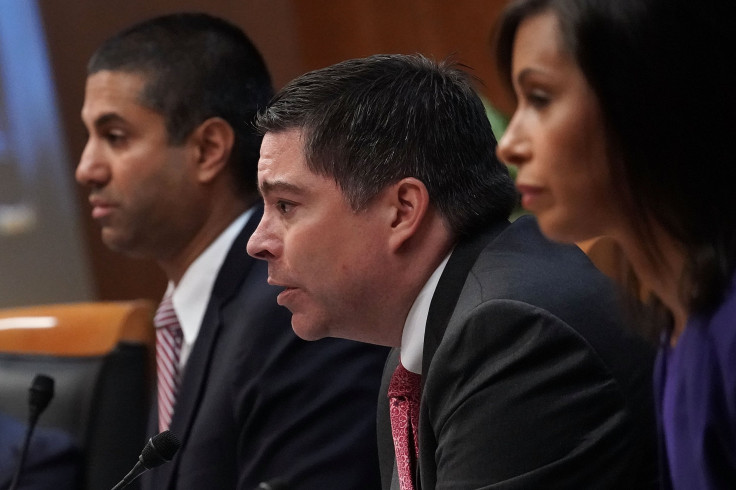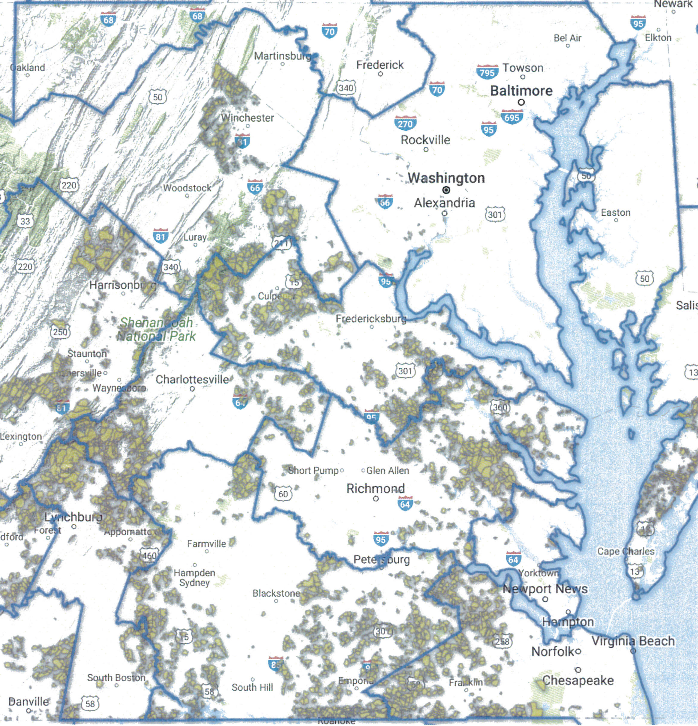Trump's FCC Could Undermine His Promise on Rural Broadband

Most of the technology Americans have come to rely on and enjoy, from radios and televisions to smartphones and WiFi, use radio frequency spectrum to transmit data. The Federal Communications Commission is currently considering changing rules, adopted two years ago, about how a specific important slice of that spectrum is allocated. In doing so, it has united public interest groups, small rural internet service providers, and massive corporations investing in the so-called “Internet of Things” against incumbent telecommunications companies.
The FCC took up the issue of re-allocating spectrum after T-Mobile and the wireless industry’s trade association, CTIA, filed a petition with the FCC last June to change the rule regarding the 3.5 GHz Spectrum band, known as the Citizens Broadband Radio Service (CBRS). The FCC adopted new rules governing CBRS in 2015, which were widely hailed as innovative and game-changing at the time.
The changes to the CBRS rules, which could thwart attempts to close the rural broadband gap, are particularly noteworthy since President Trump has made rural broadband expansion a priority for his second year in office, signing an executive order on rural broadband just last week. If his FCC moves forward with the rule change, the president risks alienating voters from rural areas who overwhelmingly voted for him in 2016 and who are expecting him to deliver broadband infrastructure improvements.
“We’re in a position again where a change in administration has caused a potential reversal in course, which is now very disruptive to an industry that invested in the assumption that they were going to have one set of rules,” Harold Feld, Senior Vice President of the consumer advocate group Public Knowledge, told International Business Times.
T-Mobile declined to comment for this story. CTIA did not respond to IBT’s request for comment.
The CBRS band is important because, as a mid-band frequency, it sits in a relative sweet spot of being able to carry significant amounts of data while still penetrating objects like trees and buildings — technologists often refer to mid-band frequencies as the “Goldilocks bands” because they’re not too low or too high, but just right. The frequency was previously protected for use without any interference by the Navy and Coast Guard, but in 2015 the FCC adopted rules opening it up to commercial use. Wireless providers like T-Mobile and AT&T covet it because of its potential use in future 5G service deployments, while Industrial Internet of Things (IIoT) manufacturers like General Electric see its value at industrial sites where companies might want to deploy their own private CBRS IIoT networks rather than rely on commercial wireless providers for connectivity.
Consulting firm Accenture estimates that the “Industrial Internet of Things” will add $6.1 trillion to the U.S. GDP by 2030 and could add up to $7.1 trillion with improvements to broadband infrastructure. A November Government Accountability Office Report recommended that the FCC track key growth statistics relating to Internet of Things usage, but the FCC rejected those recommendations out of hand as impractical.
Size Matters
The core issue of the current debate before the FCC is whether to change the size of the geographic areas for licenses auctioned off by the FCC. T-Mobile and other wireless companies want to see spectrum auctioned off at “partial economic areas” or PEAs — large areas comprised of multiple counties centered on major metropolitan zones.
General Electric, whose IIoT applications would take place in much smaller geographic areas, is one of the major counterweights to the mobile industry on this issue. The company has been heavily pushing the FCC on keeping the current license sizes, which are auctioned off at the much smaller census-tract level.

By increasing the licensing area from census tracts to PEAs, the FCC would effectively make it so that only companies with significant cash and a customer-base or use-case over a wide geographic can economically compete for the license at auction. In its filing with the FCC on the matter, GE warns that “this policy would conflict with Chairman Ajit Pai’s repeated warnings that the Commission has no business picking winners and losers in the marketplace.” Instead, GE wants to maintain the “innovative census-tract framework” for CBRS.
The issue is perhaps important to no other stakeholder than rural broadband providers, specifically “fixed wireless” or “wireless internet service providers” (WISPs), who deliver broadband internet service to their customers wirelessly from a fixed transmission point. WISPs have taken hold in rural areas where the cost of laying wired connectivity is impractical for commercial cable companies and the government has not prioritized providing subsidies in order to have wired build-outs. Instead, WISPs are often small businesses serving relatively discrete geographic areas, like a sparsely populated census tract.
“Licensed, mid-band spectrum will give us additional capacity and enable us to reach additional customers where there is not clear line-of-sight,” Jimmy Carr, chairman of the Wireless Internet Service Providers Association's legislative committee, told IBT. “If WISPs have the opportunity to bid for licensed, mid-band spectrum – on fair and equal terms with all other bidders – these entrepreneurs will quickly invest private capital and harness it to dramatically narrow the rural broadband gap.”

Critics of the the FCC opening up this opportunity for new rulemaking on CBRS view the FCC as being overly solicitous to the wireless industry, which was the only major loser in the rules passed to great fanfare just a couple of years ago.
“These rules were settled, but the FCC put out a notice of proposed rulemaking anyway which they did not have to do,” said Feld. “We are seeing Commissioner O’Rielly’s thinking that the traditional mobile carrier model is the perfect model and we shouldn’t change anything from it.”
“Is the fact that the current rules aren’t tailor-made for national cell carriers a sufficient justification for wholesale changes to an innovative policy that will harness private capital to close the rural broadband gap?” said Carr. “We don’t think so — and we don’t think ordinary Americans will either.”
From Campaign Contributor To Lobbying Client
Predictably, an aggressive lobbying campaign has accompanied the wireless industry’s comments to the FCC on the CBRS rules.
One of the telecom industry’s key players in its lobbying efforts is the firm Farragut Partners. Ed Whitfield, a former Kentucky GOP congressman, joined Farragut in 2016 and works on all of the firm’s telecom industry accounts: AT&T, T-Mobile, CTIA, and Comcast. AT&T was Whitfield’s largest campaign contributor over the course of career; the company’s political action committee gave Whitfield $106,500 throughout his 21 years in the House, according to data from the Center for Responsive Politics.
Whitfield resigned from Congress amid an ethics scandal involving “special favors” for his wife, a lobbyist for the Humane Society.
Farragut specifically lists spectrum issues on its lobbying disclosure forms for T-Mobile and Comcast , while only listing “general representation” for CTIA . Spectrum is, of course, a key issue for CTIA and its members, so it is likely that such representation would include lobbying on spectrum. In Congress, Whitfield sat on the Energy & Commerce committee, which is responsible for overseeing telecommunications and oversees the FCC. Other lobbyists on Farragut’s wireless industry accounts include former staffers from Whitfield’s own office and the Energy & Commerce committee.
At stake in the FCC’s CBRS rulemaking is the future of the projected trillion dollar growth in the U.S.’s GDP from the Internet of Things, as well as the opportunity to close the broadband gap in rural areas — one of the country’s most neglected populations when it comes to technology infrastructure.
“This is a make-or-break moment for our customers and for rural America — a once-in-a-generation opportunity to take an under-utilized public spectrum resource and solve the most pressing public policy challenge in rural America: connecting the unconnected,” said Carr.
“The 23 million rural Americans who lack basic fixed broadband service in their homes should be outraged if the FCC’s action on CBRS results in delaying the deployment of broadband in their communities for years because the FCC once again prioritizes the needs of the mobile industry over rural America.”
© Copyright IBTimes 2024. All rights reserved.





















